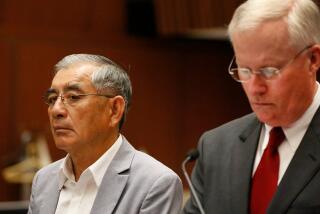Leung Indictment Is Too Vague, U.S. Judge Rules
- Share via
A federal judge has ruled that the criminal indictment brought against an accused Chinese double agent was unduly vague and has ordered prosecutors to provide a more detailed explanation of the charges.
In approving a defense request for a so-called bill of particulars, U.S. District Judge Florence-Marie Cooper said Katrina Leung was entitled to the clarification to guard against any unfair surprises by the prosecution when the case goes to trial.
A bill of particulars is issued when a judge finds a criminal indictment so vague or broadly worded that the defendant can’t prepare an adequate defense.
Cooper’s written ruling was made public Friday and followed arguments conducted behind closed doors earlier in the week.
Prosecutors had objected, arguing that a bill of particulars would give Leung information to which she was not entitled.
But Cooper disagreed, saying the defense was only seeking “an articulation of the government’s theory of the case” and that the indictment suggested many theories the prosecution could advance. She gave prosecutors until April 29 to answer 19 questions about three classified documents that form the basis of the case. They were seized in a search of Leung’s San Marino home before her arrest last year.
The 49-year-old woman is charged with illegally copying and possessing national security papers that she allegedly intended to use, or could have used, to harm the interests of the United States. She is accused of having lifted the papers from the briefcase of the FBI agent who was her handler and longtime lover, James J. Smith, 60, now retired. Smith is also charged.
Leung, a naturalized citizen, was recruited by Smith in the early 1980s to gather intelligence for the FBI on her frequent business trips to China, where she ingratiated herself with high-ranking government officials.
But starting about 1990, she began working for the Chinese too, prosecutors say, feeding sensitive, unauthorized information about the FBI to China’s Ministry of State Security.
One of the documents cited by the judge in her ruling relates to the FBI’s six-year investigation of Dr. Peter Lee, a TRW Inc. physicist who pleaded guilty in 1997 to providing Chinese scientists with classified information about nuclear weapons. The document was prepared while Lee was under investigation and, according to prosecutors, included a list of agents assigned to the case, the locations where they worked and their assignments, as well as their office, cell and home phone numbers.
Cooper directed the prosecution to explain how the document was connected to national security, how Leung knew that was so, and what evidence existed to show that she intended to use or did use the document to injure the United States.
The judge posed similar questions in connection with the other two documents.
One is a secret, seven-page communique from the FBI’s legal attache in Hong Kong written in 1997. In recent legal filings, prosecutors said the letter contained information from a confidential informant about China’s intelligence-gathering capabilities and counter-surveillance methods, along with a discussion of a possible FBI response to China’s spying.
The other document is a five-page verbatim transcript of two telephone calls and summaries of six others between Leung and her alleged handler at the Chinese ministry in 1990 and 1991. The calls were apparently intercepted by a U.S. intelligence agency. Prosecutors have stated in legal papers that the pair talked about an FBI agent’s upcoming trip to China on a counterintelligence assignment, the flight to the U.S. by relatives of a Chinese defector, and the travel to China by the subject of an FBI counterintelligence investigation.
In ordering the prosecution to prepare a bill of particulars, Cooper said Leung’s lawyers had the added burden of having to “navigate a minefield of procedural requirements” under the federal Classified Information Procedures Act. Under the act, the judge said, defense lawyers John Vandevelde and Janet Levine may view classified documents provided by the government in discovery, but can’t talk about their contents with Leung.
More to Read
Sign up for Essential California
The most important California stories and recommendations in your inbox every morning.
You may occasionally receive promotional content from the Los Angeles Times.













